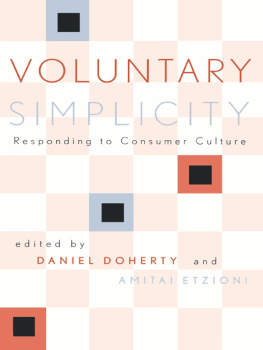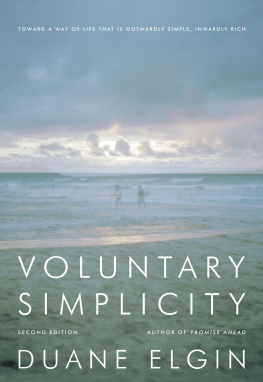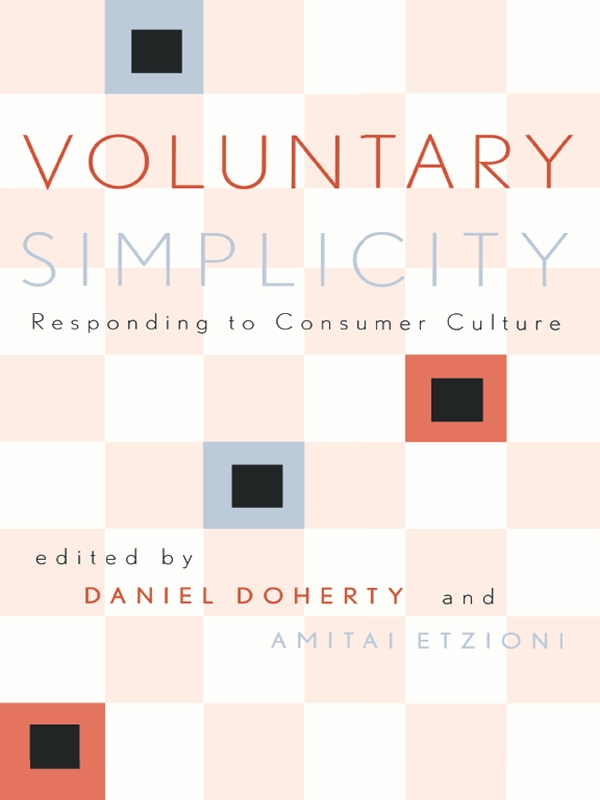The author would like to acknowledge Frank Lovett for his help with the research for a previous version of this essay, and David Karp and Barbara Fusco for their editorial comments. I am particularly indebted to comments by Professors Edward F. Diener and David G. Myers.
See Frank Musgrove, Ecstasy and Holiness: Counterculture and the Open Society (Bloomington: Indiana University Press, 1974), 17-18, 40-41, 198. Musgrove notes the paradox that although the counterculture is marked by frugality and low consumption, (17) it arises specifically in wealthy societies.
Ronald Inglehart, The Silent Revolution: Changing Values and Political Styles Among Western Publics (Princeton, N.J.: Princeton University Press, 1977), 3.
Paul R. Abramson and Ronald Inglehart, Value Change in Global Perspective (Ann Arbor: University of Michigan Press, 1995), 19. Similar shifts occurred in most developed nations (pp. 12-15).
Stanley Lebergott, Pursuing Happiness: American Consumers in the Twentieth Century (Princeton, N.J.: Princeton University Press, 1993), appendix A, 147-63.
U.S. Census Bureau, Statistical Abstract of the United States, 114th ed. (Washington, D.C.: U.S. Government Printing Office, 1994), table 695.
See Robert Paehlke, Environmentalism and the Future of Progressive Politics (New Haven, Conn.: Yale University Press, 1989); Juliet Schor, The Overworked American: The Unexpected Decline of Leisure (New York: Basic Books, 1991); and Dorothy Leonard, Voluntary Simplicity Lifestyles and Energy Conservation, Journal of Consumer Research 8 (December 1981).
See, for instance, Charles Handy, The Hungry Spirit: Beyond Capitalism: A Quest for Purpose in the Modern World (New York: Broadway Books, 1998).
Henry Urbach, Hide the Money! New York Times Magazine, 13 April 1997, 8.
Urbach, Hide, 25.
Rita Henley Jensen, Recycling the American Dream, ABA journal 82 (April 1996): 68-72.
Carey Goldberg, Choosing the Joys of a Simplified Life, New York Times, 21 September 1995, C1.
R. Henkoff, Is Greed Dead? Fortune 120, no. 4 (14 August 1989): 41.
David Molpus, Voluntary Simplicity, National Public Radios Morning Edition, 26 February 1997.
Goldberg, Choosing, C1.
Among men between 55 and 64, 85.2 percent were employed in 1960, while by 1990 only 67.7 percent were: U.S. Department of Commerce, Statistical Abstract of the United States, 1975, table 559, and 1994, tables 615 and 619. The number of persons who had retired by 63 doubled between 1960 and 1990 from one quarter to a half: To Many, Early Retirement Only a Dream, Boston Globe, 29 October 1995, 41.
More Mothers Staying At Home, Boston Globe, 18 December 1994, NW:1.
William M. Bulkeley, More Career-Switchers Declare, Those Who Can, Teach, Wall Street Journal, 8 April 1997, B1.
Henkoff, Greed, 41.
The rising pressures on American workers are detailed in Schor, Overworked American.
Lydia Saad, Children, Hard Work Taking Their Toll on Baby Boomers, Gallup Poll Monthly (April 1995): 22.
Telephone survey of 1011 Americans by the Gallup Organization, January 19-30, 1994.
Duane Elgin, Voluntary Simplicity (New York: William Morrow, 1993), 66.
Elgin, Voluntary Simplicity, especially 46-53.
Elgin, Voluntary Simplicity, 201.
Paul H. Ray, The Emerging Culture, American Demographics 19, no. 2 (February 1997): 29, 31.
Schor, Overworked American, 81-82.
West Meets East, With A Vengeance, Chicago Tribune, 25 September 1994, 13: 2.
David Filipov, Tinsel? Moscow Buys That, Boston Globe, 25 December 1996, A2.
Robert Keatley, Consumerism Is Thriving in Vietnam, Luring U.S. Companies Despite Poverty, Wall Street Journal, 13 May 1994, A7.
Ugly Americanization? Los Angeles Times, 2 September 1995, E1.
Frank M. Andrews and Stephen B. Withey, Social Indicators of Well-Being: Americans Perceptions of Life Quality (New York: Plenum Press, 1976), 254-55.
Jonathan L. Freedman, Happy People: What Happiness Is, Who Has It, and Why (New York: Harcourt Brace Jovanovich, 1978).
David G. Myers and Ed Diener, Who Is Happy? Psychological Science 6 (January 1995): 12-13; see also Ed Diener, E. Sandvik, L. Seidlitz, and M. Diener, The Relationship Between Income and Subjective Well-Being: Relative or Absolute? Social Indicators Research 28 (1993): 208.
Tim Kasser and Richard M. Ryan, A Dark Side of the American Dream: Correlates of Financial Success as a Central Life Aspiration, Journal of Personality and Social Psychology 65 (1993): 420.
Robert E. Lane, Does Money Buy Happiness? Public Interest 113 (fall 1993): 58.
Lane, Money, 56-65.
Elgin, Voluntary Simplicity, 25.
The addiction of consumption, however, is discussed in Tibor Scitovsky, The Joyless Economy: The Psychology of Human Satisfaction (New York: Oxford University Press, 1992). See also, Barry Schwartz, The Costs of Living: How Market Freedom Erodes the Best Things in Life (New York: W.W. Norton, 1994), 154-62.
Abraham H. Maslow, Toward A Psychology of Being (Princeton: Von Nostrand, 1986). I should note that Maslows writings are rather opaque and discursive. What follows is an interpretation of Maslow rather than a direct derivation.
Maslow also does not draw a distinction between prosocial self-expression (e.g., the arts), and antisocial expression (e.g., abuse of narcotics).
Paul Stern, Energy Use: The Human Dimension (New York: W.H. Freeman, 1984), 71-72.
Alan Durning, How Much Is Enough? The Consumer Society and the Future of the Earth (New York: W.W. Norton, 1992); Lester W Milbrath, Envisioning a Sustainable Society: Learning Our Way Out (Albany: State University of New York Press, 1989).
Joseph A. Pechman, Federal Tax Policy (Washington, D.C.: Brookings Institution, 1987), 6.
For instance, note the changes in the Labor Party in the United Kingdom and the Democratic Party in United States in the mid-1990s.
For more discussion of this point see Amitai Etzioni, Next: The Road to the Good Society (New York: Basic Books, 2000).








